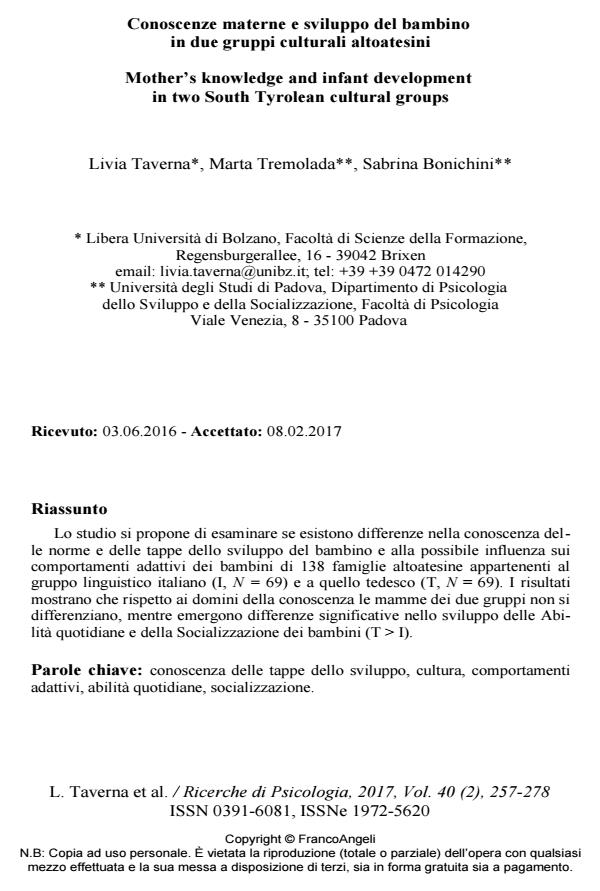Conoscenze materne e sviluppo del bambino in due gruppi culturali altoatesini
Titolo Rivista RICERCHE DI PSICOLOGIA
Autori/Curatori Livia Taverna, Marta Tremolada, Sabrina Bonichini
Anno di pubblicazione 2017 Fascicolo 2017/2
Lingua Italiano Numero pagine 22 P. 257-278 Dimensione file 284 KB
DOI 10.3280/RIP2017-002005
Il DOI è il codice a barre della proprietà intellettuale: per saperne di più
clicca qui
Qui sotto puoi vedere in anteprima la prima pagina di questo articolo.
Se questo articolo ti interessa, lo puoi acquistare (e scaricare in formato pdf) seguendo le facili indicazioni per acquistare il download credit. Acquista Download Credits per scaricare questo Articolo in formato PDF

FrancoAngeli è membro della Publishers International Linking Association, Inc (PILA)associazione indipendente e non profit per facilitare (attraverso i servizi tecnologici implementati da CrossRef.org) l’accesso degli studiosi ai contenuti digitali nelle pubblicazioni professionali e scientifiche
Lo studio si propone di esaminare se esistono differenze nella conoscenza delle norme e delle tappe dello sviluppo del bambino e alla possibile influenza sui comportamenti adattivi dei bambini di 138 famiglie altoatesine appartenenti al gruppo linguistico italiano (I, N = 69) e a quello tedesco (T, N = 69). I risultati mostrano che rispetto ai domini della conoscenza le mamme dei due gruppi non si differenziano, mentre emergono differenze significative nello sviluppo delle Abilità quotidiane e della Socializzazione dei bambini (T > I).
Parole chiave:Conoscenza delle tappe dello sviluppo, cultura, comportamenti adattivi, abilità quotidiane, socializzazione
- Parents’ Willingness and Perception of Children’s Autonomy as Predictors of Greater Independent Mobility to School Ester Ayllón, Nieves Moyano, Azucena Lozano, María-Jesús Cava, in International Journal of Environmental Research and Public Health /2019 pp.732
DOI: 10.3390/ijerph16050732
Livia Taverna, Marta Tremolada, Sabrina Bonichini, Conoscenze materne e sviluppo del bambino in due gruppi culturali altoatesini in "RICERCHE DI PSICOLOGIA " 2/2017, pp 257-278, DOI: 10.3280/RIP2017-002005